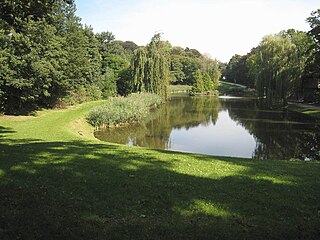 W
WAstrid Park is an urban public park in the municipality of Anderlecht in Brussels, Belgium. The park was inaugurated on 13 August 1911 and was named the Parc du Meir/Meirpark until 1935, when the mayor of Anderlecht decided to change its name in memory of Queen Astrid, the first wife of King Leopold III, who died in a car crash that year.
 W
WThe Bois de la Cambre (French) or Ter Kamerenbos (Dutch) is an urban public park on the edge of the Sonian Forest in Brussels, Belgium. The park lies in the south of the Brussels-Capital Region, in the municipality of the City of Brussels. It covers an area of 1.23 square kilometres. It is linked to the rest of the municipality by Avenue Louise/Louizalaan, which was built in 1861, at the same time the park was laid out.
 W
WThe Botanical Garden of Brussels stood on Rue Royale/Koningsstraat in Saint-Josse-ten-Noode, near Brussels’ Northern Quarter financial district. The main building is now a cultural complex and music venue known as Le Botanique. It can be accessed from the Botanique/Kruidtuin metro station on lines 2 and 6 of the Brussels metro.
 W
WThe Parc de Bruxelles or Warandepark (help·info) (Dutch), is the largest urban public park in the centre of Brussels, Belgium. The area of the rectangular park is 13.1 ha. The main entrance is on the north side, opposite the Belgian House of Parliament. An avenue leads to the main pond, from which three other avenues offer views of three important places in Brussels: the Palace of Justice, the Royal Palace and the Place du Trône/Troonplein.
 W
WDuden Park is a park located in the municipality of Forest in Brussels, Belgium. It covers 24 hectares and has a level difference of 45 metres, with its highest point being at an elevation of 90 metres.
 W
WForest Park or Vorst Park is a park located in and named after the municipality of Forest in Brussels, Belgium. It was designed by Victor Besme and occupies an area of 13 hectares.
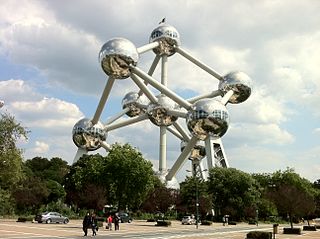 W
WThe Heysel or Heizel is the area in the north of Brussels, Belgium, where the Brussels International Exposition (1935) and the Expo '58 took place.
 W
WThe Ixelles Ponds or Elsene Ponds are two freshwater ponds in the Brussels municipality of Ixelles. The ponds we can see today are those spared by a 19th-century campaign of drying the wetlands of the Maalbeek valley between La Cambre Abbey and Eugène Flagey Square.
 W
WThe Jardin de la vallée du Maelbeek (French) or Maalbeekdaltuin (Dutch) is a small green space on the corner of Rue de la Loi/Wetstraat and Chaussé d'Etterbeek/Etterbeeksesteenweg at the heart of the European Quarter of Brussels (Belgium). It was inaugurated on 13 May 1951.
 W
WJosaphat Park is a public park of 20 hectares located in the municipality of Schaerbeek in Brussels, Belgium. The football stadium that was formerly used by the K.V.V. Crossing Elewijt lies on the north-west corner of the park. There is also an elementary school, a tennis club, the communal greenhouses, animals, two playgrounds, a minigolf course, an archery range, three cafés, a kiosk (Josaphine's), and some ponds.
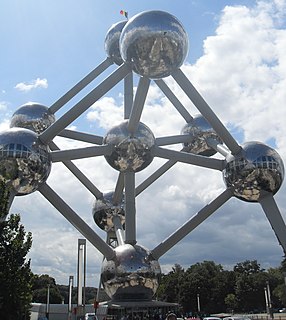 W
WLaeken or Laken is a residential suburb in north-west Brussels in Belgium. It belongs to the municipality of the City of Brussels and is mostly identified by the Belgian postal code : 1020. Prior to 1921 it was a separate municipality.
 W
WLeopold Park is a public park of 6.43 ha located within the Leopold Quarter of Brussels, Belgium. It is adjacent to the Paul-Henri Spaak building, the seat of the European Parliament. It is served by the metro stations Maalbeek/Maelbeek and Schuman on lines 1 and 5 of the Brussels metro.
 W
WMalou Park is an urban park in the Woluwe-Saint-Lambert municipality of Brussels, Belgium. It is in the valley of the Woluwe stream, to the southeast of the Woluwe Shopping Center. It is the municipality's oldest and biggest park.
 W
WThe Mont des Arts or Kunstberg, meaning "hill/mount of the arts", is an urban complex and historic site in the centre of Brussels, Belgium, including the Royal Library of Belgium, the National Archives of Belgium, the Square – Brussels Meeting Centre, and a public garden.
 W
WThis is a list of parks and gardens in the Brussels-Capital Region divided by municipality.
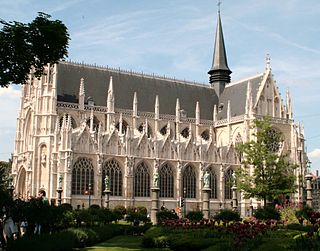 W
WThe Sablon (French) or Zavel (Dutch) is a neighbourhood and hill in the historic upper town of Brussels, Belgium. At its heart are the twin squares of the larger Grand Sablon/Grote Zavel square in the northwest and the smaller Petit Sablon/Kleine Zavel square and garden in the southeast, divided by the Church of Our Blessed Lady of the Sablon.
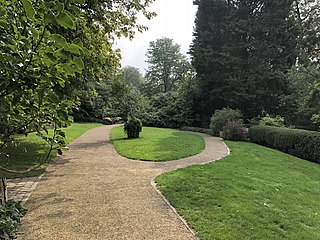 W
WTenbosch Park, Tenbosch or Tenbos, is a public park in the municipality of Ixelles in Brussels, Belgium. Although relatively small with an area of 2 hectares, it is an exquisitely landscaped park popular among local residents. It is surrounded by a wall and offers an unexpected oasis of calm in a busy district.
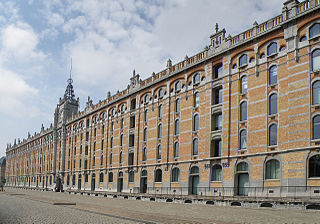 W
WTour & Taxis is a large former industrial site in Brussels, Belgium. It is situated on the Brussels Canal in the City of Brussels, just northwest of the city centre, immediately adjacent to Laeken and Molenbeek-Saint-Jean, and about 1 kilometre west from the Northern Quarter financial district.
 W
WThe Vauxhall of Brussels, otherwise known as the Waux-Hall, is a historic building in Brussels' Park in Brussels, Belgium. It is named after the pleasure gardens of Vauxhall in London, which only became known to the inhabitants of Brussels in 1761, when a ballet entitled Le Phaxal was put on at La Monnaie/De Munt theatre. In Paris, the stage-builder Torré opened a "garden of amusements" in 1764, which the public came to call the Vaux-Hall de Torré. A Vaux-Hall d'hiver was set up in 1769 at the Foire Saint-Germin.